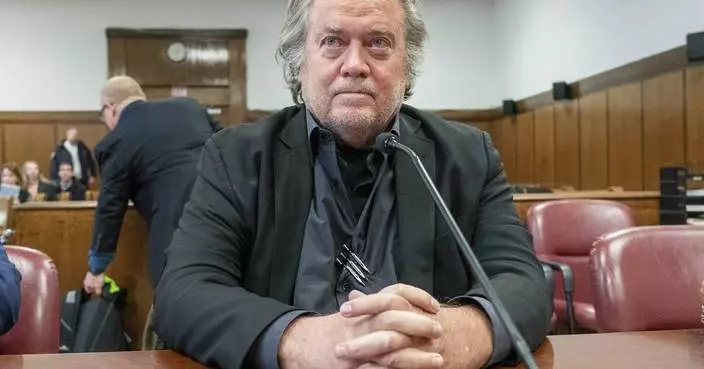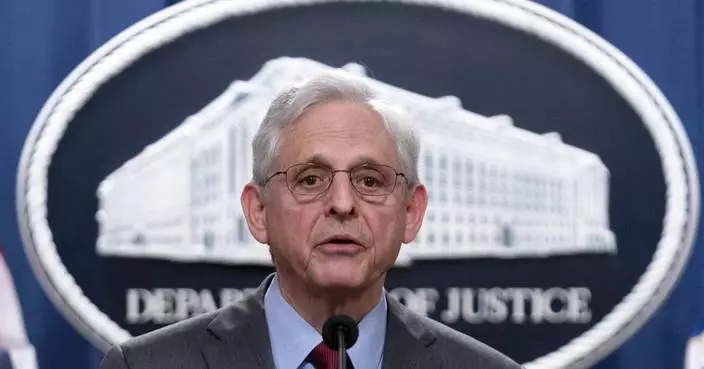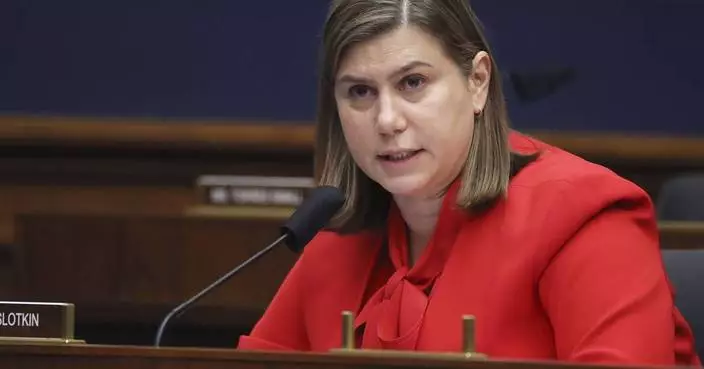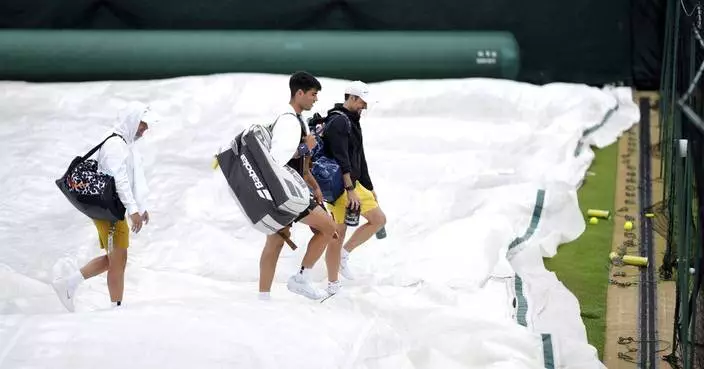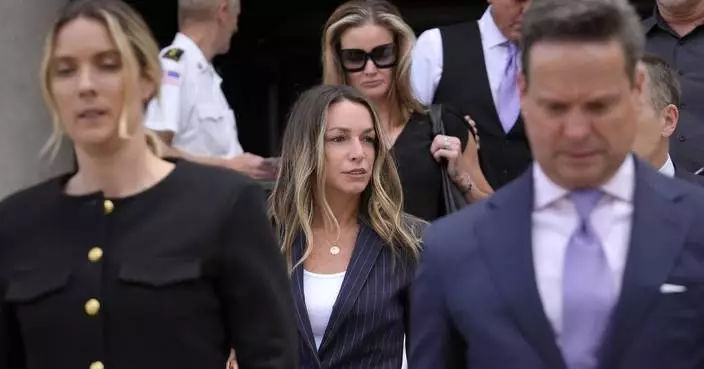WASHINGTON (AP) — The Supreme Court extended the delay in the criminal case against Donald Trump on charges he plotted to overturn the 2020 election, reducing the chance that Trump could be tried before the November election.
In a historic ruling, the justices said Monday for the first time that former presidents can be shielded from prosecution for at least some of what they do in the Oval Office. But rather than do it themselves, the justices ordered lower courts to figure out precisely how to apply the decision to Trump’s case.
The immunity case was the last case argued, on April 25.
The court has since adjourned until the first Monday in October.
Here's the latest:
House Democratic Leader Hakeem Jeffries pledged Monday that Democrats will respond to the high court’s ruling with “aggressive oversight and legislative activity” if they win back the majority in November.
“The Framers of the Constitution envisioned a democracy governed by the rule of law and the consent of the American people,” Jeffries said in a statement. “They did not intend for our nation to be ruled by a king or monarch who could act with absolute impunity.”
President Joe Biden’s campaign said in a statement that the Supreme Court’s immunity ruling on Monday “doesn’t change the facts” about the events of Jan. 6, 2021.
“Let’s be very clear about what happened on January 6: Donald Trump snapped after he lost the 2020 election and encouraged a mob to overthrow the results of a free and fair election,” the campaign said. “Trump is already running for president as a convicted felon for the very same reason he sat idly by while the mob violently attacked the Capitol: he thinks he’s above the law and is willing to do anything to gain and hold onto power for himself.”
The campaign accused the former president of growing “more unhinged” since the 2021 attack and said Biden will make sure Americans reject Trump’s quest for power “for good” this November.
Former Capitol Police Sgt. Aquilino Gonell, who was injured by former President Donald Trump’s supporters during the Jan. 6, 2021, attack on the U.S. Capitol, said the Supreme Court’s decision Monday that former presidents have some immunity from prosecution is “very disappointing.”
Gonell was in front of the Supreme Court as the ruling was handed down. He criticized the decision to return the case to a lower court, delaying the criminal case against Trump on charges he plotted to overturn his 2020 presidential election loss.
“What is it that we are playing other than delaying the inevitable, which is that Donald Trump needs to face the consequences?” Gonell asked.
Gonell, who has been campaigning for President Joe Biden, was severely beaten in the Capitol attack. He retired from the force in 2022 due to his injuries.
When it was Justice Sonia Sotomayor’s turn to pronounce the dissent on Monday in the immunity case, she gave a dramatic speech.
At the outset, she carefully pronounced the words: “Because our Constitution does not shield a former President from answering for criminal and treasonous acts, I dissent.”
She paused at certain moments and at others strongly pronounced each word. In one jab at the conservative majority, Sotomayor cited some of the founding fathers and said, “Interesting, history matters, right?”
Then she looked at the courtroom audience and concluded, “Except here.”
In another dramatic rebuke, Sotomayor said, “Ironic, isn’t it? The man in charge of enforcing laws can now just break them.”
At times, Sotomayor shook her head and gritted her team as she criticized the majority’s conclusions as “utterly indefensible” and later as elevating the president to “a king above the law.”
Senate Majority Leader Chuck Schumer denounced Monday’s ruling by the Supreme Court as “a disgraceful decision,” made with the help of the three justices that Trump appointed himself.
“It undermines SCOTUS’s credibility and suggests political influence trumps all in our courts today,” the New York Democrat said on the social platform X.
Justice Clarence Thomas issued a separate concurrence saying that he believed Jack Smith’s appointment as special counsel was illegitimate and that the case therefore violates “our constitutional structure.”
No other justice signed onto that opinion, but the question took center stage in recent arguments in a separate case against Trump charging him in Florida with illegally hoarding classified documents.
Democratic Sen. Richard Blumenthal called the Supreme Court’s ruling a “cravenly political decision,” meant to shield Trump with a “legal armor that no other citizen enjoys.”
“This is a license for authoritarianism,” the Connecticut lawmaker said in a statement Monday.
David Becker, an election law expert and the executive director of the nonprofit Center for Election Innovation and Research, called the breadth of immunity granted to Trump “incredibly broad” and “deeply disturbing.”
“Almost anything that a president does with the executive branch is characterized as an official act,” he said on a call with reporters following the ruling. “I think putting aside this particular prosecution, for any unscrupulous individual holding the seat of the Oval Office who might lose an election, the way I read this opinion is it could be a road map for them seeking to stay in power.”
Becker said even historic scandals such as Watergate could be seen differently given the ruling.
“It’s likely that Gerald Ford did not need to pardon Richard Nixon under the interpretation of presidential immunity that this court enunciates today,” he said.
Becker lamented the time the Supreme Court took with the ruling, saying Americans had an interest in knowing the result sooner given Trump’s candidacy in the upcoming presidential election.
Following its rulings in the three cases on Monday, the Supreme Court adjourned until the first Monday in October.
The majority found that the immunity they recognized extends to the “outer perimeter” of the president’s official responsibilities, setting what appears to be a high bar for determining what conduct could potentially be prosecuted.
“In dividing official from unofficial conduct, courts may not inquire into the president’s motives,” Roberts wrote. “Nor may courts deem an action unofficial merely because it allegedly violates a generally applicable law.”
The opinion found Trump is “absolutely immune” from prosecution for alleged conduct involving discussions with the Justice Department.
Trump is also “at least presumptively immune” from allegations that he tried to pressure Pence to reject certification of the vote, Roberts wrote.
The majority did reject Trump’s arguments that the indictment should be dismissed, and that impeachment is a necessary step in the enforcement of the law.
The Supreme Court kept a hold on efforts in Texas and Florida to limit how Facebook, TikTok, X, YouTube and other social media platforms regulate content posted by their users.
The justices returned the cases to lower courts in challenges from trade associations for the companies.
While the details vary, both laws aimed to address conservative complaints that the social media companies were liberal-leaning and censored users based on their viewpoints, especially on the political right. The cases are among several this term in which the justices are wrestling with standards for free speech in the digital age.
The Florida and Texas laws were signed by Republican governors in the months following decisions by Facebook and Twitter, now known as X, to cut then-President Donald Trump off over his posts related to the Jan. 6, 2021, attack on the U.S. Capitol by his supporters.
▶ Read more about today’s social media rulings.
The Supreme Court directed U.S. District Judge Tanya Chutkan to assess whether core aspects of the indictment are official acts and therefore shielded from immunity or are not official acts and therefore potentially subject to prosecution. Those include, among other things, Trump’s hectoring of Vice President Mike Pence to not certify the electoral votes — a core feature of the four-count indictment.
The three liberal justices — Sonia Sotomayor, Elena Kagan and Ketanji Brown Jackson — all dissented from the majority opinion.
In her dissent, Sotomayor wrote: “Today’s decision to grant former Presidents criminal immunity reshapes the institution of the Presidency. It makes a mockery of the principle, foundational to our Constitution and system of Government, that no man is above the law.”
In a historic 6-3 ruling, the justices said for the first time that former presidents have absolute immunity from prosecution for their official acts and no immunity for unofficial acts. But rather than do it themselves, the justices ordered lower courts to figure out precisely how to apply the decision to Trump’s case.
The outcome means additional delays before Trump could face trial in the case brought by special counsel Jack Smith.
The court’s decision in a second major Trump case this term, along with its ruling rejecting efforts to bar him from the ballot because of his actions following the 2020 election, underscores the direct and possibly uncomfortable role the justices are playing in the November election.
The Supreme Court extended the delay in the criminal case against Donald Trump on charges he plotted to overturn the 2020 election, reducing the chance that Trump could be tried before the November election.
In a historic ruling on Monday, the justices said for the first time that former presidents can be shielded from prosecution for at least some of what they do in the Oval Office. But rather than do it themselves, the justices ordered lower courts to figure out precisely how to apply the decision to Trump’s case.
The Supreme Court just opened the door to new, broad challenges to regulations long after they take effect, the third blow in a week to federal agencies.
The justices ruled 6-3 today in favor of a truck stop in North Dakota that wants to sue over a regulation on debit card swipe fees that the federal appeals court in Washington upheld 10 years ago.
Federal law sets a six-year deadline for broad challenges to regulations. In this case, the regulation from the Federal Reserve governing the fees merchants must pay banks whenever customers use a debit card took effect in 2011.
▶ Read more about the ruling in the Corner Post case.
Chief Justice John Roberts declined an invitation to meet with Democratic senators in May to talk about Supreme Court ethics and the controversy over flags that flew outside homes owned by Justice Samuel Alito.
Roberts’ response came a day after Alito separately rejected demands that he recuse himself from major Supreme Court involving former President Donald Trump and the Jan. 6 rioters because of the flags, which are like those carried by rioters at the Jan. 6, 2021, attack on the Capitol.
Both Alito and another conservative justice, Clarence Thomas, have rejected calls to recuse themselves from cases related to the 2020 election, which Trump lost to Democrat Joe Biden. Thomas’ wife, Ginni, supported efforts to overturn the election results.
The justices puzzled during arguments on April 25 over where the line should be drawn, and though it seemed unlikely from their questions that they’ll adopt Trump’s views of absolute immunity, they did seem potentially poised to narrow the case.
One option would be to send it back to the trial judge, Tanya Chutkan, for her to determine which allegations in the indictment constitute official acts and must therefore be stricken from the case — and which do not.
That kind of analysis could be time-consuming and result in additional delays. However, by the same token, a more slender set of allegations could make the case easier for special counsel Jack Smith and his team to prosecute and eat up less time on the election-year clock.
In April, the Supreme Court heard more than 2 1/2 hours worth of arguments on the landmark question of whether former President Donald Trump is immune from prosecution in a case charging him with plotting to overturn the 2020 presidential election.
Some of the many notable moments included:
▶ Read more key takeaways from oral arguments.
The justices also have three other cases remaining on the docket Monday, including another major case over social media laws in Texas and Florida that would limit how platforms regulate content posted.
Both laws aimed to address conservative complaints that the social media companies were liberal-leaning and censored users based on their viewpoints, especially on the political right.
The immunity case was the last case argued, on April 25. So in one sense, it’s not unusual that it would be among the last decided. But the timing of the court’s resolution of Trump’s immunity may be as important as the eventual ruling.
By holding on to the case until early July, the justices have reduced, if not eliminated, the chance that Trump will have to stand trial before the November election, no matter what the court decides.
In other epic court cases involving the presidency, including the Watergate tapes case, the justices moved much faster. Fifty years ago, the court handed down its decision forcing President Richard Nixon to turn over recordings of Oval Office conversations just 16 days after hearing arguments.
Even this term, the court reached a decision in less than a month to rule unanimously for Trump that states cannot invoke the post-Civil War insurrection clause to kick him off the ballot over his refusal to accept Democratic President Joe Biden’s victory four years ago.
▶ Read more about the stakes of the Trump immunity ruling.
In the last 10 days of June, on a frenetic pace of its own making, the Supreme Court touched a wide swath of American society in a torrent of decisions on abortion, guns, the environment, health, the opioid crisis, securities fraud and homelessness.
And, with the court meeting for the final time this term on Monday, an unusual push into July, the most anticipated decision of the term awaits: whether former President Donald Trump is immune from prosecution for his role in the Jan. 6, 2021, riot at the U.S. Capitol.
The court also will decide whether state laws limiting how social media platforms regulate content posted by their users violate the Constitution.
▶ Read more about what to expect as the Supreme Court term wraps.
![Celeste McCall, of Washington, reacts in confusion, Monday, July 1, 2024, outside the Supreme Court in Washington after decisions were announced. "I'm confused I was told [Trump] has no immunity for unofficial acts," says McCall. "I don't even know what that means. I'm beyond confused." (AP Photo/Jacquelyn Martin)](https://image.bastillepost.com/1200x/wp-content/uploads/global/2024/07/APTOPIX_Supreme_Court_Trump_Immunity_86727-1.jpg.webp)
Celeste McCall, of Washington, reacts in confusion, Monday, July 1, 2024, outside the Supreme Court in Washington after decisions were announced. "I'm confused I was told [Trump] has no immunity for unofficial acts," says McCall. "I don't even know what that means. I'm beyond confused." (AP Photo/Jacquelyn Martin)
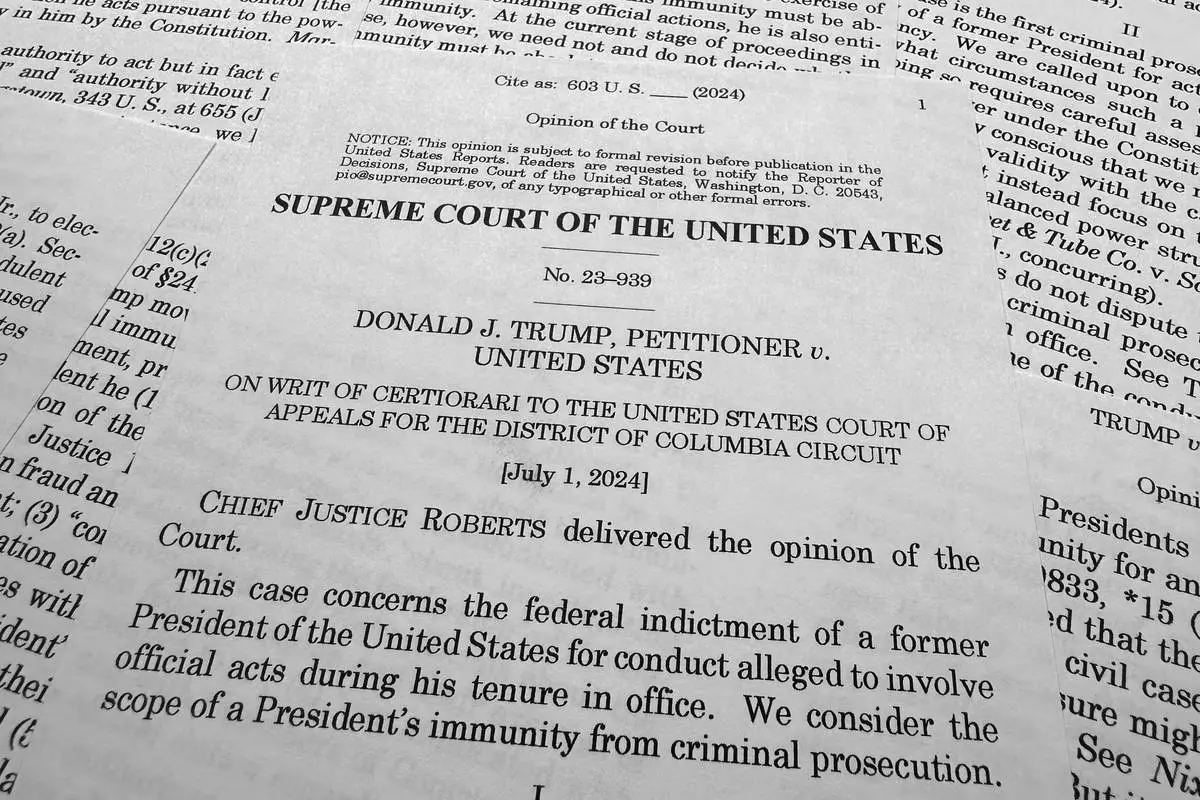
The Supreme Court opinion in former President Donald Trump's immunity case is photographed Monday, July 1, 2024. In a historic ruling the justices said for the first time former presidents can be shielded from prosecution for at least some of what they do in the Oval Office. (AP Photo/Jon Elswick)
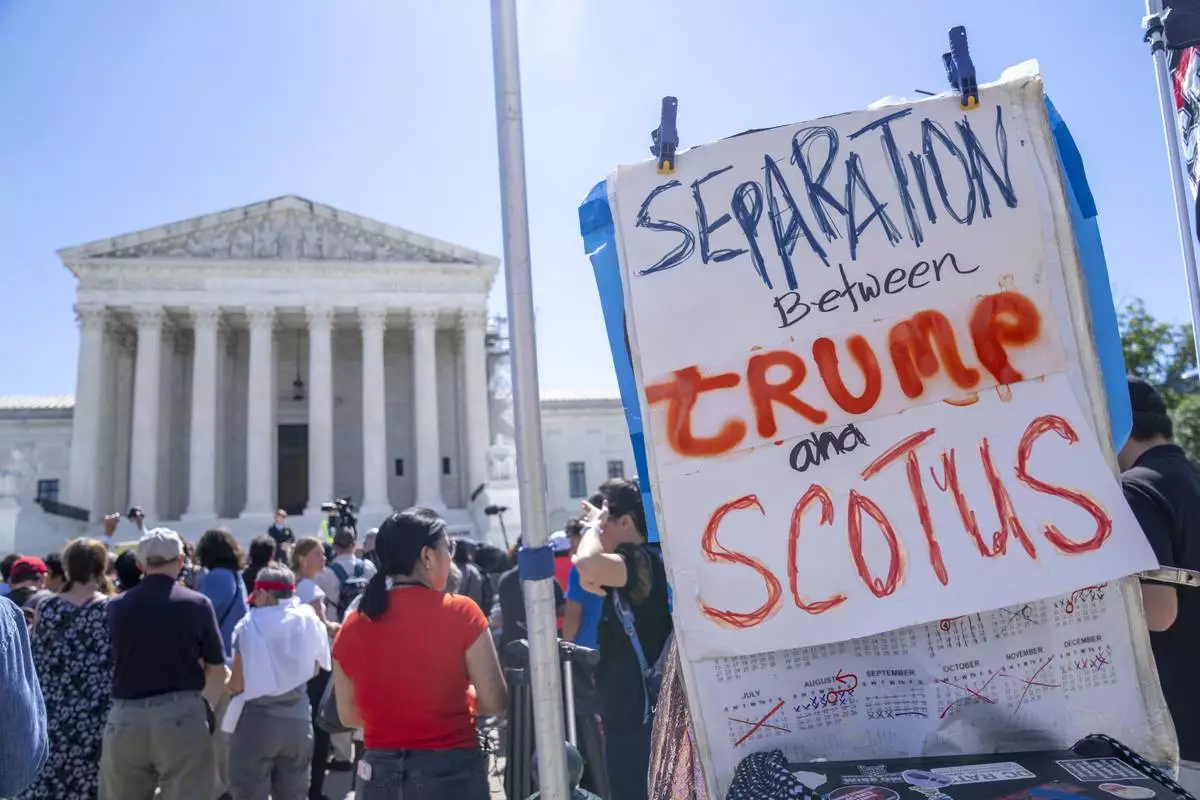
People protest, Monday, July 1, 2024, outside the Supreme Court in Washington, as decisions are announced. (AP Photo/Jacquelyn Martin)
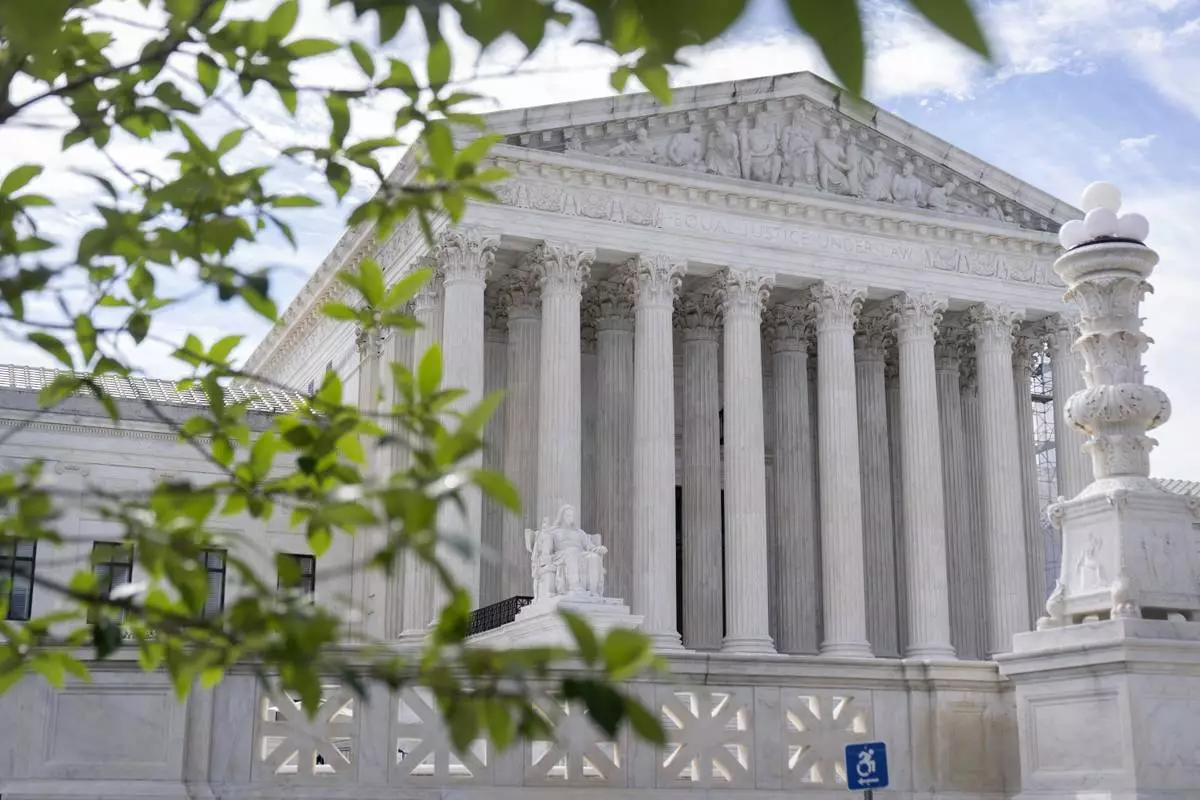
FILE - The Supreme Court building is seen on June 27, 2024, in Washington. Supreme Court justices will take the bench Monday, July 1, to release their last few opinions of the term, including their most closely watched case: whether former President Donald Trump has immunity from criminal prosecution. (AP Photo/Mark Schiefelbein, File)
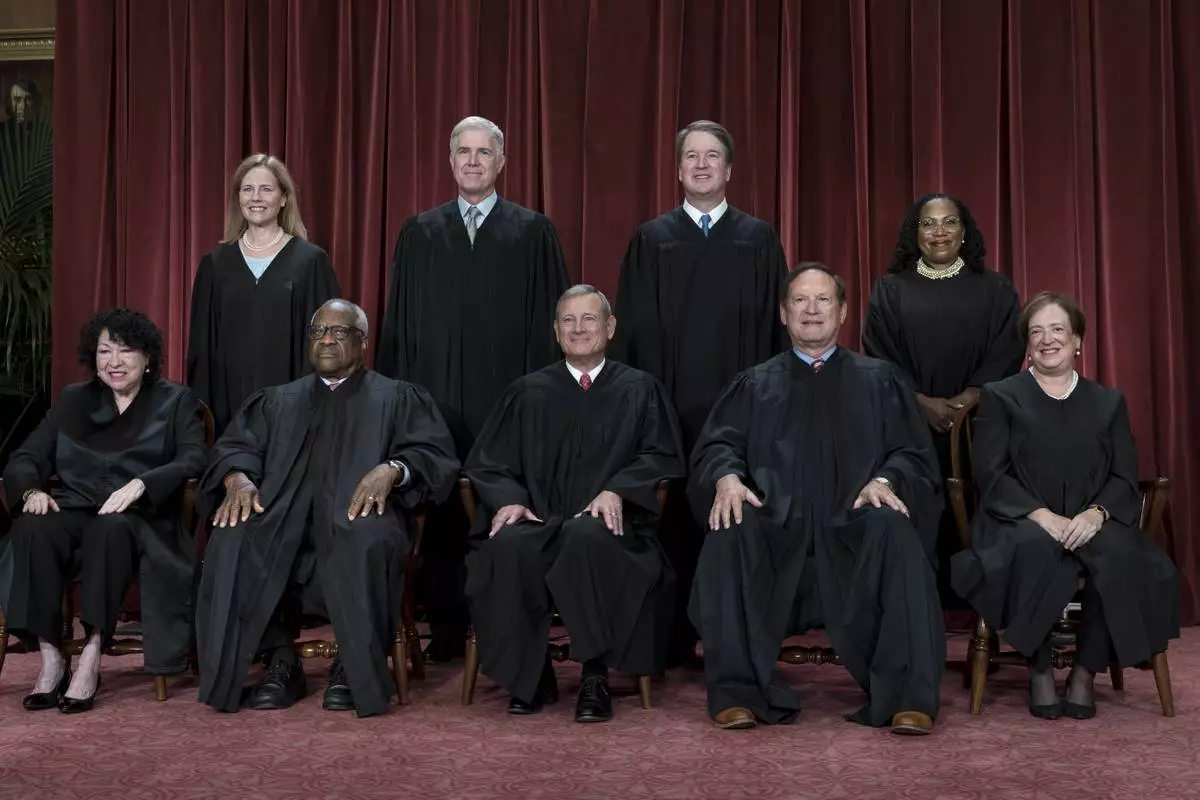
FILE - Members of the Supreme Court sit for a group portrait in Washington, Oct. 7, 2022. Bottom row, from left, Justice Sonia Sotomayor, Justice Clarence Thomas, Chief Justice John Roberts, Justice Samuel Alito and Justice Elena Kagan. Top row, from left, Justice Amy Coney Barrett, Justice Neil Gorsuch, Justice Brett Kavanaugh, and Justice Ketanji Brown Jackson. The Supreme Court justices will take the bench Monday, July 1, 2024, to release their last few opinions of the term, including their most closely watched case: whether former President Donald Trump has immunity from criminal prosecution. (AP Photo/J. Scott Applewhite)
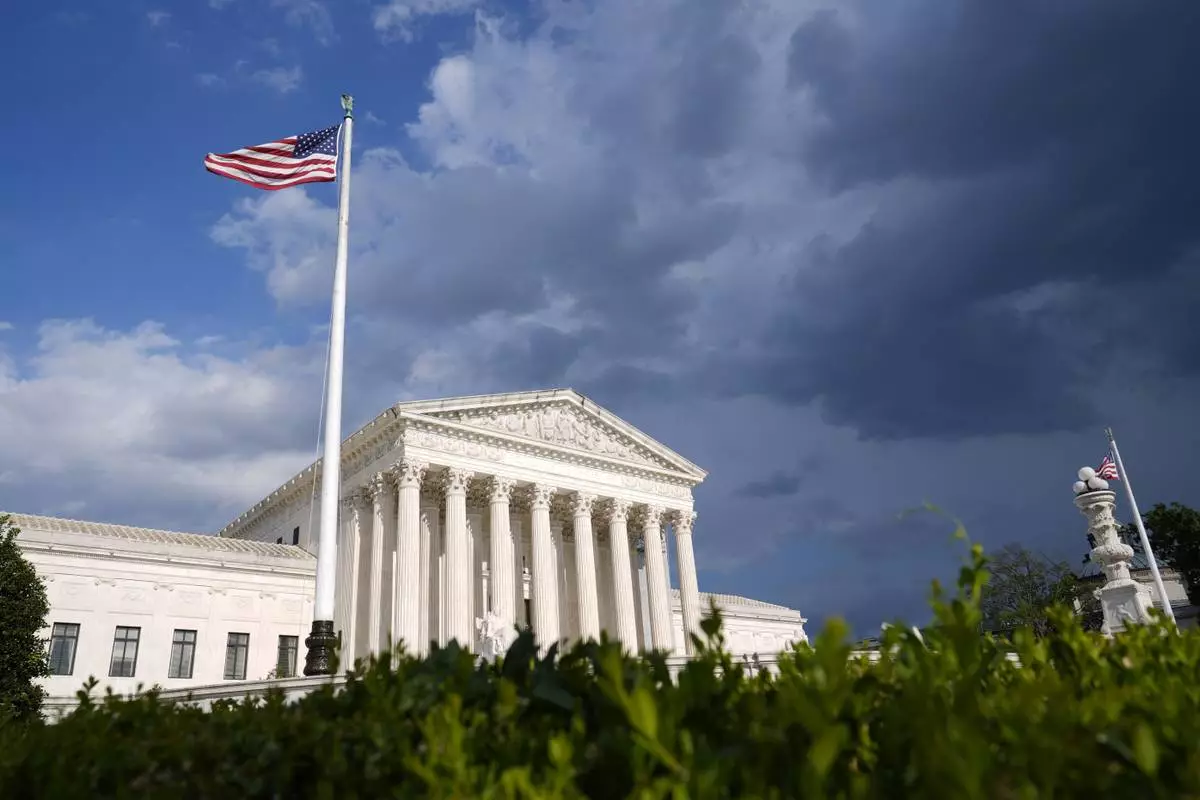
The Supreme Court in Washington, Sunday, June 30, 2024. (AP Photo/Susan Walsh)






![Celeste McCall, of Washington, reacts in confusion, Monday, July 1, 2024, outside the Supreme Court in Washington after decisions were announced. "I'm confused I was told [Trump] has no immunity for unofficial acts," says McCall. "I don't even know what that means. I'm beyond confused." (AP Photo/Jacquelyn Martin)](https://image.bastillepost.com/1200x/wp-content/uploads/global/2024/07/APTOPIX_Supreme_Court_Trump_Immunity_86727-1.jpg.webp)





